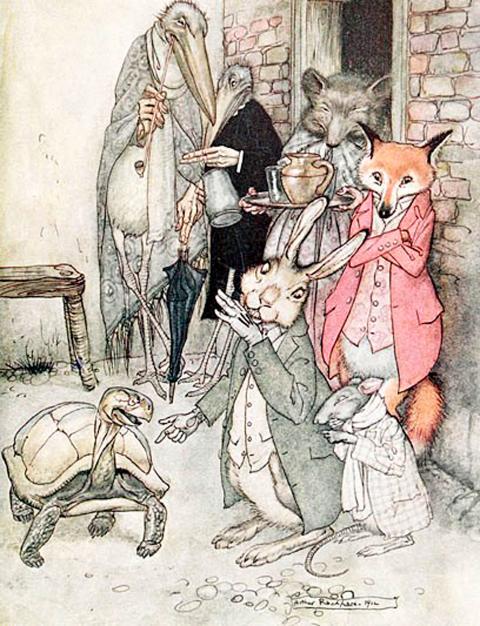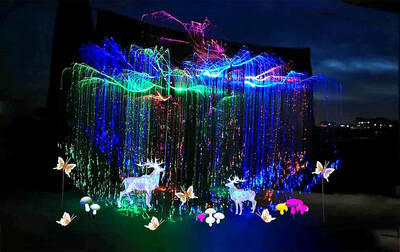Chinese Practice
欲速則不達
(yu4 su4 ze2 bu4 da2)

Photo: Wikimedia Commons
照片:維基共享資源
Things that are rushed are never accomplished
本週所介紹的成語,其背後的原則可見諸歷史上多種文化,以不同形式表達出來。《論語》〈子路〉中記載,子夏為魯國莒父邑的邑長,向孔子請教為政之道。孔子回答說:「欲速則不達,見小利則大事不成。」(操之過急,反而不能達到目的;只貪圖小利,就做不成大事。)
「欲速則不達」一語之後在西元一一一年成書的《漢書》第七十五卷再度出現,「治國故不可以戚戚,欲速則不達」(因此治理國家不可倉促為之,因為操之過急,反而不能達到目的。)
對此,羅馬帝國第一位皇帝奧古斯都顯然也是所見略同。羅馬帝國歷史學家蘇埃托尼烏斯在其所著《羅馬十二帝王傳》中記載,奧古斯都很討厭他的指揮官們草率行事,便常說:「做得好的事已經是做得夠快了」,以及「慢慢地趕快」這樣的反語,此語後來被譯成拉丁文「festina lente」,變成古代常見的一句格言。
在英文中我們常說「more haste, less speed」(越急就越慢):如果你趕著做某件事,最後反而會花更多時間來完成它。這句話的確切出處不詳,但可參考猶太經文作者便‧西拉在《便西拉智訓》(約作於西元前二○○至一七五年)所寫的:「有一個人永不停息地工作著,像個奴隸似的,可是他總是越來越趕不上。」
時間來到一六七八年的英國,約翰‧雷出版了《英文諺語集》,其中包括一個可上溯之前一百年的諺語「Haste makes waste, and waste makes want, and want makes strife between the goodman and his wife」(忙亂而為者往往造成浪費,浪費造成貧窮,貧窮造成好人與其妻之不和)。此處之「want」(要)意為「lack」(缺少)或「poverty」(貧窮);在現今我們會說成「haste makes waste」(忙亂而為者往往造成浪費)。
最後,在台灣閩南語中也有意義類似的說法「呷緊弄破碗」,意為若吃飯吃太快,反而會打破碗。
(台北時報編譯林俐凱譯)
騎車別貪快,欲速則不達,出了意外再後悔就來不及了。
(You shouldn’t bomb along the road. More haste, less speed. You’ll have an accident, and then you’ll not get there on time, anyway.)
英文練習
more haste, less speed;
haste makes waste
The principle behind this week’s idiom has been expressed in many forms, across many cultures and throughout history.
According to the Zi Lu chapter of the Confucian Analects, Zi Xia, the governor of Ju Fu, asked Confucius about good government. Confucius replied, "Desire to have things done quickly prevents them from being done (欲速則不達). Looking at small advantages prevents great affairs from being accomplished.”
The idea of desiring speed preventing one from achieving one’s objectives was repeated in the ancient Chinese Book of Han, completed in 111AD, where the same phrase — 欲速則不達 — appears in Chapter 75: “Therefore, to govern the state, you must not be too rushed, for desire to have things done quickly prevents them from being done.”
Apparently, this was a sentiment shared by the first Roman emperor, Augustus. The Roman historian Suetonius, in his De vita Caesarum (The Twelve Caesars), writes that Augustus hated rashness in his commanders, and was fond of saying things like "That which has been done well has been done quickly enough” and the rather ironic “hasten slowly,” later translated into Latin as festina lente, which was itself to become a common adage in the ancient world.
In English, we often say “more haste, less speed”: if you rush a job it will take you longer to complete it in the end. And, while the exact origins of that particular formulation are unclear, the Jewish scribe Ben Sira of Jerusalem, in his Wisdom of Sirach from approximately 200 to 175BC, wrote, “There is one [type of person] that toileth [works hard] and laboureth [labors], and maketh haste, and is so much the more behind.”
Back in Britain, in 1678, one John Ray published A Collection of English Proverbs, including a proverb dating from a century before: "Haste makes waste, and waste makes want, and want makes strife between the goodman and his wife.” Here, “want” means “lack” or “poverty.” We still say “haste makes waste” today.
Finally, there is the Hoklo (Taiwanese) dialect phrase 「呷緊弄破碗」: “if you eat too fast, you’ll break your bowl.”
(Paul Cooper, Taipei Times)
Don’t rush: you’ll make a mistake and have to do it over. More haste, less speed.
(別急,不然你會出錯,到時還得重來一次,這叫欲速則不達。)

The Lantern Festival, celebrated on the 15th day of the first lunar month, is one of the most important traditional festivals in Chinese culture. The word yuan means “first,” and xiao means “night,” referring to “the first full moon night of the lunar year.” In 2026, the Lantern Festival falls on March 3 in the Gregorian calendar. Also known as the Shangyuan Festival or Festival of Lights, the Lantern Festival marks the festive conclusion of the two-week Lunar New Year period. It symbolizes hopes for brightness, peace and reunion in the year ahead. On this day, people traditionally enjoy lantern displays, riddle-guessing

1. 他沒有看過那部電影,我也沒有看過。 ˇ He hasn’t seen the movie. I haven’t seen it, either. χ He hasn’t seen the movie. I haven’t seen it, too. 註:too 表示「也」,在肯定句中與 also 同義且更口語。too 一般放在句尾,或作為插入語放在句中;also 通常靠近動詞,不放在句尾。例如: He likes chocolate; I also like it. He likes chocolate; I like it, too. 表示「也不」,不可以在否定語的後面用 too,應用 either 或用 nor 表示否定。但口語裡有時為了強調也把 also 放在否定語的前面。例如: He doesn’t like Gone With the Wind; I don’t like it, either. He doesn’t like Gone With the Wind; I also don’t like it. He doesn’t know her phone number; nor do I. 2. 他不難過,我也不難過。 ˇ He was not upset. Neither/Nor was I. χ He was not upset. So was I. 註:承接前句述詞的動作,因而構成新的句子時,新句子的詞序是動詞在前,主詞在後。但應注意:肯定時用副詞 so,否定時用 neither 或 nor。例如:

對話 Dialogue 清清:過完年回來上班,我真的有點不太適應,早上起床變得特別困難。 Qīngqing: Guò wán nián huílái shàngbān, wǒ zhēn de yǒudiǎn bú tài shìyìng, zǎoshang qǐchuáng biàn de tèbié kùnnán. 華華:我懂你。年假每天睡到自然醒,現在一聽到鬧鐘,就很想再多睡一下。 Huáhua: Wǒ dǒng nǐ. Niánjià měitiān shuì dào zìrán xǐng, xiànzài yì tīng dào nàozhōng, jiù hěn xiǎng zài duō shuì yíxià. 清清:而且過年期間吃得比較多,最近覺得褲子好像變緊了。 Qīngqing: Érqiě guònián qíjiān chī de bǐjiào duō, zuìjìn juéde kùzi hǎoxiàng biàn jǐn le. 華華:哈哈,我也是這樣。所以我打算年後開始調整生活作息,慢慢收心。 Huáhua: Hāhā, wǒ yě shì zhèyàng. Suǒyǐ wǒ dǎsuàn nián hòu kāishǐ tiáozhěng shēnghuó zuòxí, màn man shōu xīn. 清清:你是怎麼調整的?我想改變,可是常常沒有動力。 Qīngqing: Nǐ shì zěnme tiáozhěng de? Wǒ xiǎng gǎibiàn, kěshì chángcháng méiyǒu dònglì. 華華:我下班後會去快走,偶爾騎腳踏車,流點汗之後,精神會好很多。 Huáhua: Wǒ xiàbān hòu huì qù kuài zǒu, ǒu’ěr qí jiǎotàchē, liú diǎn hàn zhīhòu, jīngshén

Steam curls from a shallow iron pot as thin ribbons of beef turn from ruby to blush. Warishita — a mixture of soy sauce, sugar and mirin — goes in, and the room fills with a salty-sweet aroma. Tofu slips in beside mushrooms and greens, chopsticks hover and voices soften. More than a hot pot, “sukiyaki” is a table-side ritual that invites everyone to cook and enjoy at the same pace. The name is believed to be associated with the iron “suki,” a kind of spade once used by farmers for cooking and later replaced by shallow pots. As cultural taboos